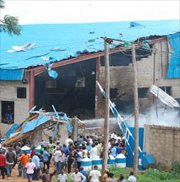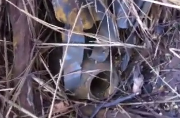Explosions hit three TV viewing centers during high-profile soccer match.
By Obed Minchakpu
JOS, Nigeria, December 15 (Compass Direct News) – Joshua Dabo, like other young Christians in this city in central Nigeria, had dreams for his life. He had graduated from a Christian high school, Mt. Olives Secondary School, and at 31 was finally looking forward to attending university.
Apart from commitment to his fellowship at Nasara Baptist Church at Tirji Junction near the University of Jos, Dabo ran a barbershop to earn income as he awaited admission to college, and he was an ardent soccer player and fan.
As such he made sure to be among the 120 people from the Christian community on Bauchi Ring Road who paid to watch a classic soccer rivalry, Barcelona FC v. Real Madrid, on TV at an outdoor bar (called a “viewing center” in Nigeria) on Saturday night (Dec. 10). A few minutes into the match, televised in the hall of corrugated sheet metal at Yangwava Television Viewing Center at Ukadum village, a bomb went off.
“It was shocking for me,” said viewing center owner Emmanuel Exodus Nimkun, 30, of the Ukadum congregation of the Church of Christ in Nigeria (COCIN). “I saw Joshua Dabo standing without a head. I have never seen a thing like this – a human being standing but with his head blasted off, and he was struggling to move.”
Dabo was the lone fatality in three bomb blasts targeting viewing centers in predominantly Christian areas of Jos during the Spanish soccer match; at least 10 others were injured in the blasts, leaving four in critical condition, including two in a coma.
Nimkun told Compass that he was bleeding and his back was hurt after the explosion, but he held Dabo and brought him down.
“I began to cry, and suddenly there were shouts that another bomb was hidden in a bag beside the viewing hall that had not exploded,” he said. ‘We all ran out, and then a policeman came to the scene. He picked up courage and went to check the bag, and the device was intact.”
A few minutes later, military personnel arrived and took the device away, he said.
“They told us that the battery of the device had run out, and that that was the reason it did not explode,” Nimkun said. “If it had exploded, they told us, the destruction could have been massive.”
Nimkun said his cousin was badly injured and was among six people taken to Jos University Teaching Hospital.
A worker with the Plateau State Independent Electoral Commission, Nimkun said he opened the TV viewing center for additional income, never considering that it would become a target for Muslim extremists. The culprits were unknown at press time, but the area has a history of Christian-Muslim conflict.
“I cannot reconstruct that place again, because it will keep reminding us of that sad incident – if only for the remembrance of Dabo, I will not reopen that place again,” he said. “This is a person killed not because he has done anything wrong but because he is a Christian.”
Danladi Dabo, Joshua Dabo’s older brother and a member of Nasara Baptist Church, said he was at home when he first heard an explosion at another viewing center, in Jos’ Tina Junction area.
“Knowing that my brother is a soccer fan, I raced to the viewing center near our house to alert them, but just about 100 meters to the place, my fears were confirmed as a bomb exploded,” Dabo said. “I was dazed by the explosion, but I kept running there, knowing that my brother was in there. On getting there I found my brother’s body but with no head. I was shocked.”
Family members buried Joshua Dabo on Sunday (Dec. 11).
Danladi Dabo said that Christians in Jos have reached out to their Muslim neighbors, but Muslims seem uninterested in peaceful relations with Christians.
“The government has urged us to live peacefully with each other, but while we Christians have accepted to live peacefully with Muslims, they have continued to attack us,” Dabo said. “I pray and urge the Nigerian government to take decisive steps to stop these killings, now that they know that Muslims are the aggressors.”
Damaged House
One of the survivors of the attack, 22-year-old Gift Danjuma of Zumunci Baptist Church in the Ukadum area, told Compass that her family has lost four members to religious conflict in Jos in the past three years.
“I thank God that I survived this attack, but this is becoming too much for us,” she said. “In the last three years we’ve had four members of our family killed – Umaru Haruna, Salami Mainoma Dutse, Esther Ishaya, and Ruth Danladi.”
Muslim extremists killed Haruna, Ishaya and Danladi as they returned from work in 2008, while Dutse was killed in 2010 while returning from a church activity, she said.
“Unless the Nigerian government does something urgently to curtail these attacks on us Christians by Muslims, we will get to the point that Christians will have no other option than to fight back in order to stay alive,” Danjuma said.
At Tina Junction along the Bauchi Ring Road in Jos, where the first bomb exploded, Hiroshima Ishaku Nyam, a member of the Jos Jarawa COCIN congregation, told Compass that his house was damaged by the bomb at the TV viewing center opposite his house.
“I was sleeping when the sound of a loud explosion woke me up,” Nyam said. “The entire house was shaking and vibrating. Suddenly the ceiling in my bedroom and the living room caved in.”
He switched on a flashlight but could hardly see anything, he said.
“There was dust all over,” Nyam said. “I struggled until I found my way out of the room. It was then that I heard people outside our house shouting that a bomb had exploded at the TV viewing center opposite our house.”
Nyam said his family had travelled to Abuja for a church program, so he was able to restrain himself from running out to check on them. Some 20 minutes later, he heard gunshots outside, confirming his resolve to stay inside.
Ironically, he said, the University of Jos had organized a peace meeting that brought together area Christians and Muslims a few meters from one of the bombed viewing centers.
Nyam said that after the bombings, it will be difficult for Christians to trust Muslims again.
“How will Christians be convinced that Muslims really want genuine reconciliation in the face of the bombings and secret killings of members of Christian communities going on in the city of Jos?” he said.
The third TV viewing center bombed is located opposite the University of Jos Staff Quarters along Bauchi Ring Road. It is also a few meters away from a Christian ministry known as City of David.
James Daniel, 22, an apprentice carpenter and a member of the Evangelical Church Winning All Nasarawa Gwong congregation, told Compass that about 100 Christians were watching the soccer game at the TV viewing center.
Daniel, whose carpentry workshop is near the TV viewing center, said the bombs planted at Tina Junction and Ukadum went off first.
“Most of the viewers here are Christian students of the University of Jos who reside here,” he said. “Thank God none of them died, as most of them only sustained injuries.”
Daniel said that ever since the Christmas Eve bombings in the Angwan Rukuba area of Jos last year, Muslims have targeted Christians through bombings or secret killings.
Plateau state has seen religious conflict since 2001.
END





